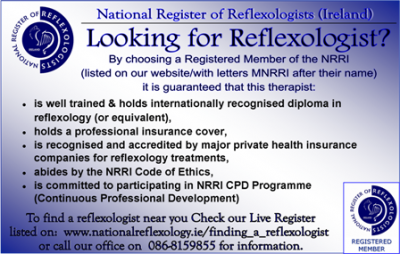LOOKING FOR REFLEXOLOGIST? >>CLICK HERE>>
REFLEXOLOGY AND MULTIPLE SCLEROSIS
Reflexology treatment reported to have relieved symptoms of Multiple Sclerosis.
Multiple Sclerosis (MS) is the most common disabling neurological condition of young adults, affecting approximately 6,000 people in Ireland. Anyone may develop MS, but it occurs twice as often in women as in men - (MS is not connected to pregnancy). The most common age of diagnosis is between the late twenties and mid-thirties, and its onset is rare after the age of fifty.
MS is a chronic condition of the central nervous system. Despite considerable research the causes remain unknown, but they are thought to be a combination of genetic and environmental factors. The symptoms are unpredictable and can vary considerably. Pain, fatigue, visual loss, headaches, depression, slurred speech, tremors, stiffness, difficulty in walking and loss of balance, in severe cases there can be partial or complete paralysis.
The symptoms are caused by patches of scarring in the central nervous system. It is not known what actually triggers the scarring process. Nerve fibres are covered by a fatty substance called the myelin sheath, the myelin, as well as protecting the nerves, assists the passage of messages along the nerves from the brain to all parts of the body. With MS the myelin sheath covering the nerves in the brain and spinal cord becomes scarred. The scarring occurs in scattered patches, distorting or preventing the smooth flow of messages from the brain and spinal cord to all parts of the body.
There is no typical MS. It is individual to each person, so one general description and certain prognosis is not possible.
There is no cure for MS but there are drugs that can modify its course for some people and symptoms can be managed.
In a randomised clinical trial carried out at The Sheba Medical Centre in Israel to evaluate the effect of reflexology on MS symptoms, it has been found that specific reflexology treatment is of benefit in alleviating motor, sensory and urinary symptoms in MS patients.
Method: seventy-one MS patients were randomised between a study group and a control group, to receive an 11 week treatment. Reflexology treatment included pressure on specific points of the feet and massage of the calf area. The control group received non-specific massage of the calf area. The intensity of paresthesias, urinary symptoms, muscle strength and spasticity was assessed at the beginning of the study, again after 6 weeks of the treatment, also at the end of the study, and at three months follow-up.
Results: Fifty-three patients completed the study. Significant improvement in the differences in mean scores of paresthesias, urinary symptoms and spasticity was detected in the reflexology group. Improvement with borderline significance was observed in the mean scores of muscle strength between the reflexology group and the control group. The improvement in the intensity of paresthesias remained significant at the three months follow-up.
Conclusions: Specific reflexology treatment was of benefit in alleviating motor, sensory and urinary symptoms in MS patients.
Sources:
1. MS Ireland.
2. The Complementary Medecine Clinic (Siev-Ner I; Gamus D; Lemer-Geva L; Achiron A),
3. Department of Orthopaedic Rehabilitation, Sheba Medical Centre, Tel-Hashomer, Israel.


 Our Objectives
Our Objectives CPD Programme
CPD Programme




